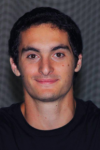 |
Maggie Mae Mell, Ph.D. Maggie Mae was a full time research assistant in the CAN lab. She received her B.A. in Psychology from Rutgers University in 2005. She is currently pursuing her PhD in Neuroscience.
|
|
 |
Wendy Sun, B.S. Wendy majored in Neuroscience at Yale (class of 2018), and was a Postgraduate Research Associate at CAN lab. She is currently persuing her MD-PhD at Harvard University.
|
|
 |
Ross MacLean, Ph.D. Ross earned his Ph.D. in Clinical Psychology from Pennsylvania State University in 2015. He is currently an Advanced Fellow in Mental Illness Research, Education, and Clinical Center (MIRECC) at the VA Connecticut Healthcare System and Yale University. His research is focused on identifying neurobiological and behavioral mechanisms involved in the maintenance and treatment of addiction.
|
|
 |
Matthew SchaferMatthew was a full time research assistant in the CAN lab. He received his B.A. in Psychology from William & Mary in 2014. His interests include cognition-emotion interaction, mindfulness and social cognition. He is currently pursuing a Neuroscience Ph.D. at Mount Sinai.
|
|
 |
Shosuke Suzuki, B.S. Shosuke was a full time research assistant in the CAN lab. He graduated from UCLA with a B.S. in Neuroscience in 2014. He is currently pursuing his Ph.D. at Emory University.
|
|
 |
Bethany Goodhue, B.A. Bethany was a full time research assistant in the CAN lab. She received her B.A. in Psychology from Yale in 2016. She is now persuing her Ph.D. at University of South Florida.
|
|
 |
Reuben Hendler, M.D. Reuben was a full time research assistant in the CAN lab. He received his degree in cognitive science from Calhoun College at Yale in 2014. He is interested in the psychology of living well – how the mind assigns ethical and moral value and produces feelings of meaningfulness and fulfillment. He practices meditation and hopes to study its potential use in cultivating mental habits conducive to human flourishing. He is also interested in how emotion regulation techniques may be skillfully implemented in light of heuristics for evaluating experience like the “ends-and-peaks” rule.
|
|
 |
Darby HenryDarby was a Cognitive Science major in Pierson College. As an undergraduate research assistant in the CAN lab, she helped work on a couple super cool meta-analysis related to the neural mechanisms underlying craving and the significance of craving in addiction.
|
|
 |
Joseph Taylor, M.D., Ph.D. Joe earned his MD and PhD in Neuroscience from the Medical University of South Carolina. Broadly, Joe’s research focuses on pairing brain stimulation techniques with brain imaging techniques in order to map and modulate the aberrant neural networks associated with refractory psychiatric and neurological symptoms.
|
|
 |
Nilofar Vafaie, M.S. Email: nilo.vafay@yale.edu
Nilo is a research associate at CAN Lab. She graduated with a Master’s in Biomedical Engineering from Northwestern University. Her interests include the neural and cognitive bases of emotion dysregulation and their role in the development and maintenance of psychopathology, as well as computational psychiatry, meta-analyses, and mindfulness.
|
|
 |
Hailey YetmanHailey is an Neuroscience major in Davenport College (class of 2020). As an undergraduate research assistant, she has worked on a meta-analysis that models how cue reactivity and craving affect treatment outcomes. Now, she is working on a study that examines the efficacy of brief training on ability to regulate craving and subsequent substance use. Broadly, Hailey is interested in neural mechanisms behind disorders and disabilities and intends on pursuing medical school.
|
|
 |
Uri Berger, Ph.D. Uri Berger was a Postdoctoral Fellow in the CAN lab. He received his doctoral degree in Psychology from Bar-Ilan University. His M.A. degrees in psychology (experimental and clinical) are from the universities of Bar-ilan and Tel-Aviv. Uri’s past focus was on the origins of social disgust. Currently he is working on a project investigating the role of craving in binge drinking. Specifically, he will examine the effects of regulation of craving training (ROC-T) on young adults who binge drink. To approach these questions he will use various methods, including cognitive tasks, affective-related tasks, and brain imaging.
|
|
 |
Jessica Mollick, Ph.D. Email: jessica.mollick@yale.edu
Jessica is interested in the brain mechanisms involved in learning and decision making, and the role that neuromodulatory systems such as dopamine play in these tasks. Her research focuses on computational neural network models of the basal ganglia, amygdala and dopamine system, with a particular focus on expanding those models to look at the role of dopamine and the basal ganglia in negative valence learning and understanding the brain mechanisms that drive prediction errors for worse than expected outcomes. She has applied these models to a variety of learning tasks. Her empirical research focuses on fMRI, using a conditioned inhibition experiment with juice rewards that draws on worse than expected prediction errors, and involves applying temporal-differences learning and neural network models to this experiment, as well as a pain learning task, to assess the fit of these different models to fMRI data in dopaminergic and subcortical regions. She is interested in comparing the fit of different models with empirical data, and looking at how evaluation of reward and punishment outcomes relates to addictive behaviors.
|
|
 |
Sophy Xiong, B.S., B.A. Email: yihan.xiong@yale.edu
Sophy (Yihan) Xiong is a full time research assistant in the CAN lab. Sophy graduated from UCLA (Class of 2018) with a double major in Psychobiology (B.S.) and Linguistics (B.A.). She has previously worked on the neurogenetics of autism, and novel treatments for anxiety and depression. Her current interests include the neural correlates of addictive mechanisms, and of clinical interventions for SUD. When she is not in lab, she can be found salsa dancing, trapeze flying, theater acting, or taking a nap.
|
|
 |
Rob PalmerEmail: rob.palmer@yale.edu
Rob is a medical student at Yale (class of 2021) who’s helping with the CAN Lab’s research on mindfulness and CBT interventions for craving regulation in people trying to reduce or quit smoking. He has previously contributed to research on ibogaine and 5-MeO-DMT for the treatment of concerning opioid use as well as on research at the University of Southern California that involved fMRI and EEG imaging of long-term meditators. He hopes that he will–before he graduates from medical school–help conduct research that explores the effects of mindfulness interventions on implicit bias.
|
|
 |
Stephanie MaltaStephanie is a junior in Morse College from Miami, Florida majoring in Neuroscience. Her current research interests include emotion, addictive behaviors, gender differences and public health applications. Outside of lab, you can usually find her reading or at an a cappella performance.
|
|
 |
Lili Margitai
Lili is a Neuroscience major in Branford College (class of 2020). She has worked on a study that analyzed the regulation of craving in heavy drinkers [CTNA] and on a study that looks at how stress affects heavy smokers’ ability to regulate their cravings [ROC-Shock]. Now, she is working on a smoking cessation randomized controlled trial (RCT) neuroimaging study [PDC3].
|
|
 |
Daniel RiceDanny is a Cognitive Science major in Jonathan Edwards College (class of 2020). He has worked on a study looking at the effects of stress on regulation of nicotine cravings [ROC-Shock], and a meta-analysis modeling how cue reactivity and craving affect treatment outcomes. Now, he is working on a smoking cessation randomized controlled trial (RCT) neuro-imaging study [PDC3]. More than anything, he’s just happy to be here.
|
|
 |
Taylor SpadoryTaylor received her B.S. in Psychology from Yale (class of 2021) and is currently a master’s student at the Yale School of Public Health in the Department of Social and Behavioral Sciences. She has worked on a variety of projects at CANLab, including an ongoing clinical trial testing the efficacy of regulation of craving training on heavy drinking in young adults, as well as a meta-analysis examining the effects of negative emotions on eating and weight. Her research interests include neural mechanisms behind disordered and addictive behaviors, with specific focus on eating and substance use.
|
|
|
|
Geraldine Hernandez-Marin |
|
|
|
Jennifer Wang |
|
 |
Kiran DamodaranKiran is a senior in Pauli Murray College majoring in Economics and English. His research interests include neural mechanisms of addiction and change, adolescent addiction and treatment, and emotion regulation. In his free time, he loves writing poetry and playing soccer, lacrosse, and guitar.
|
|
 |
Audrey EdelmanAudrey Edelman is a full-time Postgraduate Associate for both Dr. Hedy Kober’s Clinical & Affective Neuroscience Lab and Dr. Jutta Joormann’s Affect Regulation & Cognition Lab. Audrey graduated with a bachelor’s degree in psychology from Simmons University in 2019 and joined the CAN Lab in spring of 2021. She primarily works on coordinating an NIH-funded fMRI study which investigates the impact of maternal depression history on child emotion regulation. Her main research interests include child emotion regulation, risk factors for internalizing disorders, and psychopathology in the family context. Audrey hopes to go on to pursue a graduate degree in clinical psychology to continue studying these topics.
|
|
 |
Doyoung JeongDoyoung graduated from Yale in 2022 with a B.S. in Neuroscience and English. Doyoung has been part of various projects at CAN Lab and explored topics such as negative affect, stress, and food cravings. She is currently working on a meta-analysis examining the relationship between negative emotions and drug use.
|
|
 |
Jennifer OkoloJennifer is a junior in Trumbull College majoring in Cognitive Science on the pre-med track. She has previously contributed to research involving spinal cord injuries and neural regeneration. Her current research interests include craving regulation, substance use disorder interventions, mindfulness, and emotional regulation.
|
|
 |
Sophie Shang, M.S. Email: fei.shang@yale.edu
Sophie (Fei) Shang is a full time research assistant in the CAN lab. Sophie graduated from University College London with a Master of Research in Cognitive Neuroscience. Previously, she went to UC Berkeley and double majored in Cognitive Science and Psychology. She studies the cognitive and affective processes underlying major psychiatric disorders using computational modeling, behavioral testing and neuroimaging. Her current interests include the neural correlates of addictive mechanisms, and clinical intervention methods.
|
|
 |
Astra ToyipAstra is a senior in Benjamin Franklin college majoring in Neuroscience on the pre-med track. She has previously contributed to research involving reward prediction errors in substance use disorders as well as the role of mindfulness interventions. Currently, she is working on her senior thesis project with the CAN lab looking at the neural correlates of wins and losses in individuals with substance use or gambling disorders.
Outside of the lab she enjoys dancing with Yaledancers and serves on the board of Black Pre Health at Yale.
|
|
 |
Osaru Uwa-OmedeOsaru Uwa-Omede is a sophomore in Davenport college studying Neuroscience on the pre-med track. Her research interests include addiction, emotion regulation, and memory, especially in relation to dreaming.
|
|
 |
Daniel Wang, B.A. Email: daniel.wang.dw758@yale.edu
Daniel is a full-time research assistant in the CAN lab. He graduated from UC Berkeley with a B.A. in Cognitive Science in 2019. He has primary research experience utilizing sparse coding neural networks to up-sample computational fluid dynamics simulations, and he has research experience with qualitative psychology research studying how narrative identity is formed in adolescents and is influenced by socio-contextual factors. His interests include understanding the neural mechanisms behind addictive behaviors, emotional regulation, and development of clinical treatments.
|
|